|
1.
CENTRAL/ WEST AFRICA
Freight rates impact W. African non-premium species
Prices for logs and lumber were unchanged as of mid-October. Poor logging weather has kept
production only at moderate levels, hampering log transport internally and also affecting road
transport of lumber from the Central African Republic. The restricted supply has helped hold
prices steady.
It is reported that producers in Congo Brazzaville have resumed exports of Okoume logs, as the
government has suspended or not fully implemented the quota system that had temporarily
curtailed exports. It is possible that Gabon will modify or postpone temporarily their quota system,
as it appears the introduction of the quota system had not yet been completed.
Freight charges to Asia have risen quite strongly with the rate for Okoume logs now USD25 /m3
higher in the past 6 weeks and freight for redwood logs up by USD45 /m3 in the same period. Some
shippers in Gabon are starting to ship logs in containers as this is said to result in lower
overall costs for transport, loading and freight. The higher freights have seriously affected the non-premium
species as freight costs are now above the initial price paid for the logs. Buyers have now virtually
halted purchases of a wide range of lesser used species and are now concentrating on
Okoume and premium timbers to be shipped in smaller vessels.
NGO report points to World Bank¡¯s deficiencies in Congolese forests
Forestnewswatch.com reported on a new NGO report that discusses the World Bank¡¯s Inspection
Panel assessment of two World Bank funded projects in the Congo¡¯s rainforests. The report notes
that the two projects could have potentially exploited Congo¡¯s rain forests. The study
notes that Bank staff told Congolese officials that logging revenues from the forests would be higher than they
are in reality. In addition to pointing to a number of deficiencies of the projects, the Rainforest
Foundation¡¯s report said that the Inspection Panel¡¯s assessment was a victory for the
Congo¡¯s indigenous people whose ¡®rights and livelihoods would be seriously harmed by inappropriate
development¡¯.
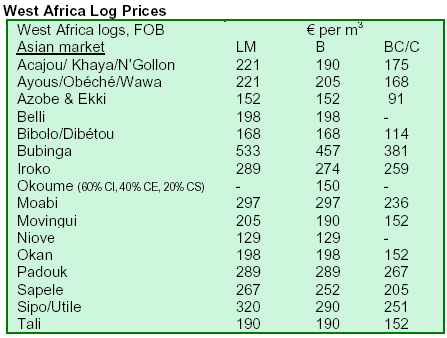
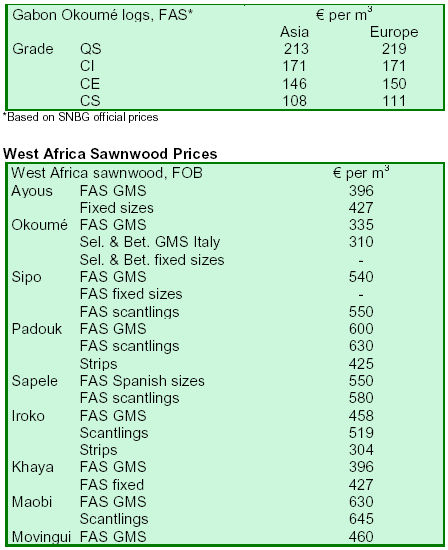
2. GHANA
Tema Port to expand capacity and upgrade facilities
The Ghana Ports and Harbors Authority (GPHA) is to construct a modern container terminal at the
Tema Port. This is in line with the authority¡¯s plan to improve and expand facilities, at both the
Tema and Takoradi ports. The Tema port recently acquired three ship-to-shore
cranes and four gantry cranes to enable the port cope with the significant increase in container traffic. GPHA also
intends to take measures to reduce the cost of doing business at the ports.
Meanwhile, the Takoradi Port is poised to handle the expected volume of growing business as a
result of the oil discovery at the Cape Three Points in the Ahanta West District of the Western
egion. Expansion projects have already been undertaken at the slipway and dry dock
located within the port to handle larger vessels.
Mrs. Agnes Dennis-Moses, the Public Relations Manager of Takoradi Port, said with the discovery
of oil, business would boom at the port in future, since companies in the oil business, particularly
those who establish oil refineries in the region, would ship their equipment through
Takoradi Port.
Marketing techniques discussed at Ghanaian workshop
A three-day workshop on marketing fundamentals for exporters, financial institutions, and small and
medium scale enterprises was recently held in Sunyani. The workshop, which was organized by the
Ghana Export Promotion Council (GEPC), International Finance Corporation (IFC), and Private
Enterprise Partnership for Africa, aimed to provide the basic information on practical
export marketing techniques and upgrading marketing operating skills of exporters. Approximately 10,000
exporters are currently exporting about 3,000 registered products from Ghana.
At the workshop, participants also called for the diversification of the country's export of cocoa,
timber and gold to other commodities. They identified currency of payment, imposition of high tariffs
and trade barriers as major challenges facing Ghana's trade in the international
market and called for a national policy that would sustain exports to neighboring African countries.
Mr Aryan Kizito, Brong-Ahafo Regional Director of the Ministry of Trade, Industry and President's
Special Initiatives, noted that the region was endowed with abundant horticultural, agricultural and
other resources that could be tapped to help accelerate the pace of development. ¡®The only problem
facing us is how to exploit the potential to create wealth¡¯, he said.
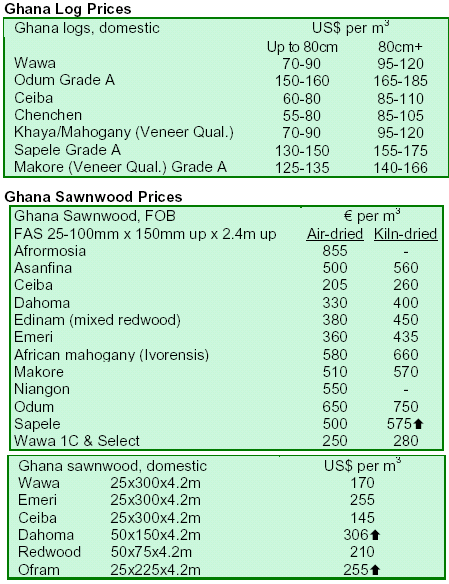
3.
MALAYSIA
Forest Plantation Loan established to plant timber trees
The Straits Times reported on a new Forest Plantation Loan facility worth RM1 billion, which will be
used to establish timber plantations and not palm oil. The Malaysian Ministry of Plantation
Industries and Communities said the Loan is designed to ensure that participants are committed to
ensure there is enough raw material supply for plywood, veneer and furniture making
industries. Participants initially provide a 20% down payment for the cost of the forest plantation before being
eligible for a loan, which would cover the remaining 80% of the venture. The plantations are
expected to be planted mostly with high value commercial species such as
Kelempyan, Batai, Binuang, Rubberwood, Khaya and Acacia Mangium.
Sabah¡¯s urban areas getting greener
The Sabah Daily Express said that a statewide programme designed to plant trees in Sabah¡¯s
urban areas will be initiated on 26 October in Sandakan. The Sabah Timber Industries Association
(STIA) will be implementing the programme, in conjunction with the Forestry Department
of Sabah, Universiti Malaysia Sabah and the Daily Express. The programme will be start of measures to
encourage people to plant commercial or ornamental trees.
President of the STIA, Datuk James Hwong, noted that the public were not aware of how industry
has been working in cooperation with the Forestry Department in the replanting scheme, in
sustainable forest management and low impact logging. He said that ¡®there will come a day
when nobody in the world will want to buy timber extracted from the natural forest but only from
plantations¡¯. He also indicated that Sabah should learn lessons from European countries where
natural forests have nearly vanished.
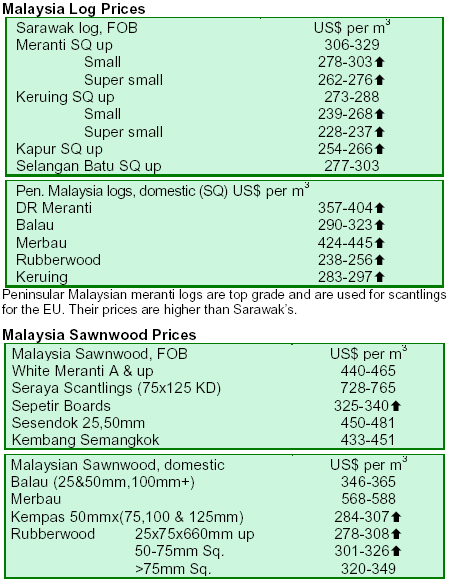
4.
INDONESIA
Indonesians plant 79 million trees in one day
The AFP reported Indonesia¡¯s plans to plant 79 million trees in a single day in 71,000 villages and
8,000 other administrative areas on 28 November. The event is part of the UN Environment
Programme¡¯s initiative to plant one billion trees in 2007 and ahead of the upcoming UN
Framework Convention on Climate Change, which Indonesia will host from 3-14 December. The project was
also initiated in light of its illegal logging problems, which the country has struggled to reduce to
about 600 to 700 cases, down from 3,600 in 2005.
SIPPO changes guidelines for Indonesian timber companies
The Swiss Import Promotion Programme (SIPPO) has announced that it will introduce a more
stringent selection criteria for Indonesian timber companies. Local companies
that wish to be included in SIPPO will now have to submit evidence that they have completed or will soon acquire
Forest Stewardship Council or Lembaga Ekolabel Indonesia certification, which must be confirmed
by anindependent auditor. To arrive at this conclusion, SIPPO conducted a mission to Indonesia in
June with the assistance of WWF in Switzerland and Indonesia and the National Agency for Export
Development. At the end of the mission, five companies were selected to cooperate
closely with SIPPO.
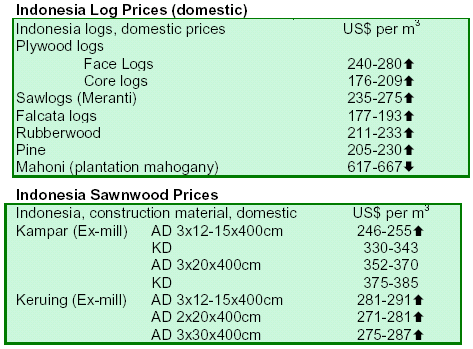
5.
MYANMAR
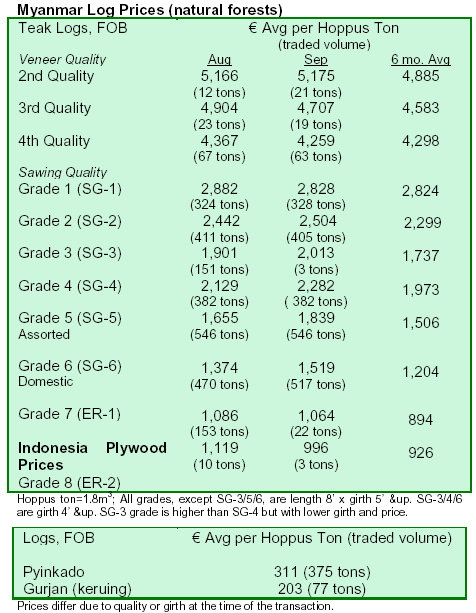
6. INDIA
India holds regional workshop on teak wood products
A regional workshop on the processing, marketing and trade of quality wood products from teak
plantations (ITTO project PD 416/06 (I)) was held in Kerala, India, from 25-28 September 2007. The
main outcome of the workshop was to draft an ITTO project proposal, which will be further
elaborated among the countries of the region to develop best processing practices for quality
wood products of planted teak and build capacity among target beneficiaries.
Comments on the draft proposal included that the project should focus on value added processing
according to market demand, obtain early involvement from relevant stakeholders, especially
industry, and investigate the administrative arrangements necessary for effective
coordination of the project. Another important recommendation that arose from the workshop was the
need to improve the genetic material for teak plantations as well as to look into the possibility of exchanging such
genetic material between the countries involved in the project. Finally, participants also discussed
current price trends on teak. Chart 1 below offers recent prices gathered from participants at the
workshop.
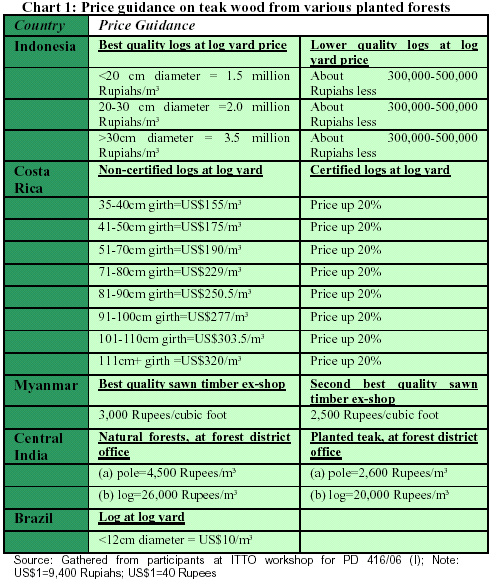
7.
BRAZIL
Brazil NGOs launch proposal to end Amazon
deforestation
As reported on Forestnewswatch.com, nine NGOs have proposed that Brazil draft a national
agreement to end deforestation in the Amazon. The launch of the proposal, which was attended by
the Minister of Environment Marina Silva, included calls for Brazil to adopt a national
agreement to tie public policies with market strategies to reduce deforestation. The NGOs estimate that
approximately EUR390 million is needed to promote the reduction of deforestation and maintain
existing forests.
Arauco broadens company¡¯s stake in Brazil
TTJ Online reported on Arauco¡¯s deal with Stora Enso to buy its companies assets in
Arapoti. Arauco will pay US$208 million for new assets, including for control of
the Stora Enso Arapoti sawmill and 80% of the company¡¯s 30,000 hectare forest holdings. Stora Enso hoped it would
be the start of other joint projects in Latin America.
Private-public partners work to make soy sustainable
Cargill, a US multinational, and the environmental organization The Nature Conservancy have
teamed up to assist with reforestation on denuded land as part of a new ¡®Responsible Soy Project¡¯.
Under the project, farmers in Santarem and Belterra in northern Amazon can sell soy to
Cargill if they plant trees on the land, a stipulation set by McDonald¡¯s, which buys significant amounts of
chicken feed made from Brazilian soy. The actions would be undertaken in compliance with Brazil¡¯s
Forest Code.
The Christian Science Monitor reported on the developments, noting conservationists¡¯ belief that the
model could be used as a potential model for sustainable development in all of the world¡¯s
rainforests. The idea would be that this type of programme helps curb deforestation by stopping the
cutting of forests in new areas, and could be a useful illustration for comparative
commodities such as ethanol and palm oil. The soy projectwas taken by Cargill in response to a two-year Greenpeace
report which stated that Cargill was the biggest offender inencouraging farmers to deforest areas
and plant soy.
IBAMA intensifies actions against illegal wood
Manejo Florestal and A Tribuna reported on the Brazilian Institute of the Environment and Natural
Resources¡¯ (IBAMA) new actions to reduce illegal logging in the Brazilian Amazon. IBAMA, the
federal and civil police have already closed four sawmills in the state of Rondonia
that have been using illegal logs. IBAMA targeted a cluster city in Alto Paraiso, after noticing that the small
town with local sawmills had woodyards that were completely full and logs had been abandoned in areas
of the municipality. Out of the ten sawmills inspected in the town, four were closed, as the owners
could not justify the origin of their wood supply.
In a related case, five municipalities in Para were inspected by IBAMA and the Environmental
Police Battalion (BPA) in September 2007. The two groups have been working together to combat
the transportation and storage of illegal logs as well as charcoal production in
areas previously closed by IBAMA. Many of the charcoal ovens were destroyed by authorities and over BRL3
million in fines were collected. Authorities found that valuable species such as Ipe, Jatoba, Guajara were
being used as fuelwood in these ovens. Environmental groups are also calling for IBAMA to
investigate cases of illegal log transport in the state of Acre.
New measures to stop deforestation agreed
Manejo Florestal said that the Commission on Environment and Sustainable Development of the
House of Representatives approved the National Pact for Valuing the Forest and Ending
Deforestation in the Brazilian Amazon in early October 2007. The goal of the Pact is to
reduce deforestation and recover land areas already damaged. It has three focuses: 1) economically valuing
the forests; 2) recovering deforested areas; and 3) controlling illegal deforestation. To finance this
plan, public and external funds from local companies and investors have been considered. The plan
is expected to be complete in seven years and will encompass biodiversity conservation
and preservation of the indigenous and traditions. The Plan will also require an annual investment of
BRL350 million in the state of Mato Grosso alone. This is the an estimated cost to subsidize
compensation of rural landowners in avoided deforestation schemes.
Wood products exports grow 32% in Mato Grosso
The Ministry of Foreign Trade (MDIC) announced that the value of exports of wood products in Mato
Grosso had increased 32.6% in 2007 compared to the first eight months of 2006, reported S¨®
Not¨ªc¨ªas. The exports are concentrated on tropical sawnwood and plywood. While
the news was released, some timber companies received the news with caution. The Union of the Timber
Industries of the Northern part of the State (Sindusmad) said that the sector passed through a slow
period in 2006, when passed through a slow period in 2006, when environmental management
responsibilities of the Brazilian Institute of Environment (IBAMA) were shifted
to the State Secretary of the Environment (SEMA). As a result, management plans were slow to be approved and
raw materials could not be extracted. Companies relied on the wood in stock, since new raw materials
were not available.
Alta Floresta wood products gain in international market
Since January 2007, manufactured wood products from the Alta Floresta cluster of Mato Grosso
have been responsible for nearly 100% of the exported wood products statewide, said S¨® Not¨ªc¨ªas.
The products, worth USD13.7 million in trade, consist mainly of doors, wood frames and panels for
wood flooring. Sales rose 53% over the same period in 2006, when USD2.1 million was
exported. In August, the city exported USD2.2 million worth of products alone, the highest monthly volume of
the year.
Most of the products from Alta Floresta sold to the US are responsible for 49% of sales, totalling
USD6 million. The products are also designed for markets in Spain, Canada, Japan, Lebanon and
China. The cluster has also registered growth of imports by value.
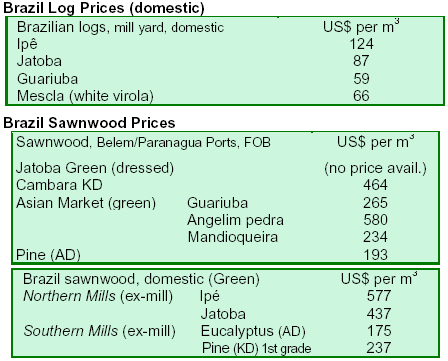
8.
PERU
Compliance with FTA poses challenges
The Economist recently covered events in Peru targeting illegal logging activities in Peru¡¯s Amazon.
The news reports captured a less than rosy picture of Peru¡¯s logging activities, where legal
boundaries defined for mahogany extraction seemed of limited utility outside of Lima.
Previous analysis of land cover by the Carnegie Institution (see TTM 12:15) showed the positive effects of
Peru¡¯s changes introduced by Peru¡¯s government since 2001, but the article noted the difficulties
Peru may have in complying with the new US-Peru FTA (see TTM 12:18). While The Economist
article speculates on Peru¡¯s sources of finance to reduce illegal trade in mahogany and comply
with the FTA, ITTO will offer such financial assistance to Peru. A recent project (PD215/03 Rev.3 (I)) on
mahogany measurement and tracking has recently been completed (see reference in TTM 12:17). A
report of the project will be included in the next issue of ITTO¡¯s Tropical Forest
Update. ITTO will also be undertaking the first part of its initial activities to curb illegal trade of endangered
mahogany from Peru as part of its new work programme with CITES.
Peru furniture mainly artisan
According to a consulting firm Maximize, the Peruvian wood furniture sector is characterized by a
family based industry with a predominantly artisan style. The sector is characterized by scarce
technological advances in designs and product finishing and standardization is usually low.
The report also highlights Peru¡¯s furniture sector obtains 90% of its supply from small and micro
enterprises, with production problems in product finishing and quality. Finally, the survey notes that
medium and large enterprises with higher product technology make wood furniture
available for the local market, with specialized stores, US$ per m3 malls or direct order mail acting as suppliers.
Falling US dollar affects Peru¡¯s competitiveness
The Peru exporters association (ADEX) reported that eight export sectors, especially the textile, the
chemical and fishing sectors had been the most affected by the falling US dollar against the Peru
Nuevo Sol. This has been impacting Peru¡¯s market competitiveness, driving down
demand for Peru¡¯s products against other cheaper products. The president of ADEX has also complained
about the Central Reserve Bank because it has not intervened strongly enough to prevent volatility in the
price of the US dollar. Scotiabank reported that the Sol has appreciated 3.5% this year, the fifth
highest among Latin American countries.
Lumber Sector Awards to be held
On 2 November, the Third Lumber Convention will be held and will discuss problems and
alternatives to develop Peru¡¯s lumber sector. In conjunction with the Convention,
awards will be given in categories for best forest products exporter, higher added value forest products exporter,
plywood exporter, and technology innovators.
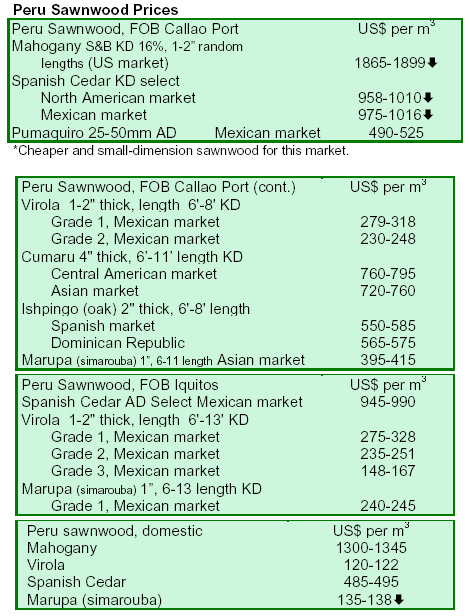
9.
MEXICO
Forest Expo 2007 helps boost business worth MXN75 million
The fifth 21st Century Forest Expo Mexico, held from the 27 to the 29 of September, closed with
transactions near 75 million pesos. The President of Mexico, Felipe Calderon Hinojosa, opened the
meeting, announcing the opening of a bank to grant financing to the forest sector,
which would be worth more than 2 billion Mexican pesos. He also called for all federal government offices to buy
certified furniture and recycled paper from sustainable forest plantations.
10.
PANAMA
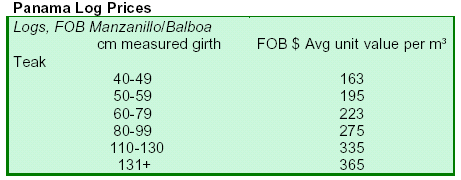
11.
BOLIVIA
Value-added products boost exports growth
There are a higher percentage of value-added products in Bolivia¡¯s 2007 total exports. Despite this,
the wood products exports growth rate by value is similar to that of last year, 21% in January ¨C July
of 2007 compared to 22% in the same period of 2006. Value-added products represented 66% of a
total of US$63.7 million exported compared to 59% last year. In terms of volume, there was
also an increase, from 42% participation in 2006 to 46% in 2007. This shows that the rise of added value
products exports, rather than a price effect or an increase in wood primary goods such as sawn
lumber, has contributed to this year¡¯s trend. The US is the main value-added Bolivian
wood products importer. In terms of volume, exports to the following countries grew: Peru (fiberboard), Argentina
(fiberboard, furniture and parquet), the UK (furniture), Italy (moulding and flooring), the Netherlands
furniture, doors and parquet) and Spain (pallets, decking and doors).
Forest fires encroach on productive land
Intense fire activity occurred in Bolivia during the last week of September to the first week of
October. Fires were concentrated mainly in Santa Cruz, where the fire was mainly caused by
agricultural activities to brush or crop residue clearing. Although 25 productive forest land
areas were affected and 369 separate fires active, rain activity has somewhat controlled the situation.

12.
GUYANA
Indigenous group saves massive swath of rainforest
Mongabay.com reported on Conservation International¡¯s work with the Wai Wai community in
uyana, an indigenous group that has established a reserve in Guyana¡¯s rainforests. After receiving a
title of 625,000 hectares of land in 2004, the Wai Wai have decided to implement a ¡®conservation
economy¡¯, in an effort to maintain the forest and prevent the exit of younger
indigenous members of the community. Conservation International will explore potential applications of
payment for ecosystem services and expand traditional craft businesses.
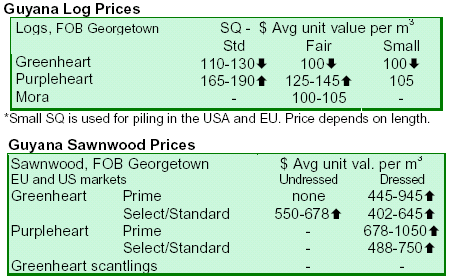
|